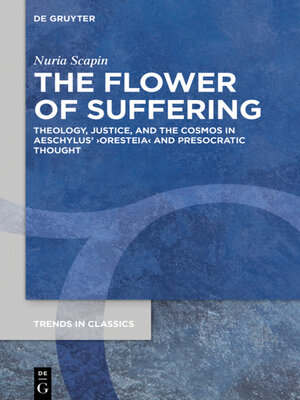The Flower of Suffering
ebook ∣ Theology, Justice, and the Cosmos in Aeschylus' ›Oresteia and Presocratic Thought · Trends in Classics--Supplementary Volumes
By Nuria Scapin

Sign up to save your library
With an OverDrive account, you can save your favorite libraries for at-a-glance information about availability. Find out more about OverDrive accounts.
Find this title in Libby, the library reading app by OverDrive.



Search for a digital library with this title
Title found at these libraries:
| Library Name | Distance |
|---|---|
| Loading... |
Greek tragedy occupies a prominent place in the development of early Greek thought. However, even within the partial renaissance of debates about tragedy's roots in the popular thought of archaic Greece, its potential connection to the early philosophical tradition remains, with few exceptions, at the periphery of current interest. This book aims to show that our understanding of Aeschylus' Oresteia is enhanced by seeing that the trilogy's treatment of Zeus and Justice (Dikê) shares certain concepts, assumptions, categories of thought, and forms of expression with the surviving fragments and doxography of certain Presocratic thinkers (especially Anaximander, Xenophanes, Heraclitus, and Parmenides). By examining several aspects of the tragic trilogy in relation to Presocratic debates about theology and cosmic justice, it shows how such scrutiny may affect our understanding of the theological 'tension' and metaphysical assumptions underpinning the Oresteia's dramatic narrative. Ultimately, it argues that Aeschylus bestows on the experience of human suffering, as it is given in the contradictory multiplicity of the world, the status of a profound form of knowledge: a meeting point between the human and divine spheres.







